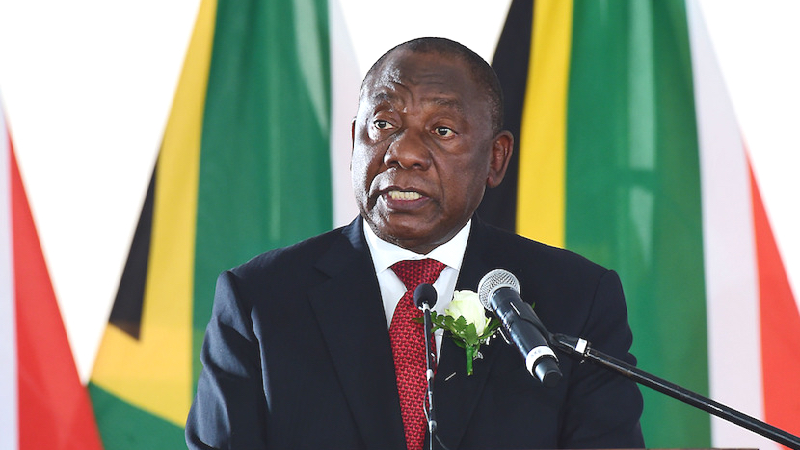President Cyril Ramaphosa is involved in a bitter struggle with Public Protector Busisiwe Mkhwebane who has instituted various investigations into both the head of state and Pravin Gordhan, the minister of public enterprises and his most trusted reformist.
Mkhwebane is expected to make an adverse finding against Ramaphosa related to the donation of R500 000 to his ANC leadership campaign, and she has already found against Gordhan.
Mkhwebane, who took over from Thuli Madonsela as Public Protector in October 2016, is being defended by many who have been implicated in various scandals including ANC secretary general Ace Magashule and EFF leader Julius Malema.
READ MORE – Ramaphosa to Mkhwebane: ‘I will wait for court before disciplining Gordhan … if at all’
Ramaphosa’s dilemma is that under Madonsela the Public Protector’s credibility was restored and the office’s powers affirmed by the chief justice and the Constitutional Court (in the Nkandla matter). Given his stated intent to repair and uphold the independence and function of state institutions he cannot dismiss Mkhwebane as a political hack, notwithstanding two scathing High Court judgments that set aside high-profile investigation reports.
Both men are in a constitutional bind … but Mkhwebane has not covered all her bases.
What is the status of the conflict?
Gordhan has filed papers in the Gauteng High Court in Pretoria challenging the findings of Mkhwebane’s investigation into a pension-related matter dating back to 2010. Ramaphosa has made his final representations to Mkhwebane in the donation matter and is bracing for an adverse finding.
How binding are the findings of the Public Protector?
In 2016, the Constitutional Court ruled in no uncertain terms that the remedial action recommended by the Public Protector was binding and should be implemented. The ruling, by Chief Justice Mogoeng Mogoeng, came after both the legislature under then-speaker Baleka Mbete and the executive under then-president Jacob Zuma ignored Madonesela’s findings and the remedial action about Nkandla.
There was a differing view, however?
Yes, before the Nkandla judgment the Western Cape High Court adjudicated that the Public Protector’s remedial actions “are not binding and not enforceable”. The Public Protector’s report, however, may not be ignored and when it rejects them it cannot be irrational. Zuma and Parliament’s legal teams argued the same, but Chief Justice Mogoeng rejected it.
The country’s supreme court was pretty clear.
Chief Justice Mogoeng argued that the Public Protector would have no standing and no respect if the remedial action was optional and could be ignored. Society is anchored in the rule of law and the Public Protector derives its power from the Constitution.
What laws govern the Public Protector and what does it say about remedial action?
The Public Protector was established by Sections 181 and 182 of the Constitution and states the office has the power – regulated by legislation – to “take appropriate remedial action”. It is also governed by the Public Protector Act, and its actions and recommendations specifically by section 6 of that act.
Must Ramaphosa act against Gordhan, given the court’s judgment and Mkhwebane’s findings?
That seems to be a bone of contention. Mkhwebane insists that Ramaphosa must act on her findings and institute disciplinary procedures and that only a court interdict – separate from Gordhan’s review – can suspend the remedial action.
Will Ramaphosa do so?
No. The president said he would not act against Gordhan because a legal process is underway to set aside the report. He has, however, given the Public Protector feedback within the time frame as she has prescribed.
Are there grounds for Ramaphosa’s position?
At paragraphs 81 and 82 in the Nkandla judgment, Chief Justice Mogoeng found that the findings and remedial action taken by the Public Protector could only be set aside in a court of law. There is, however, a difference between an appeal and a review process.
READ MORE – ANC on Mkhwebane vs Ramaphosa: ‘We are all equal before the law, respect Chapter 9 institutions’
But what happens when a report is challenged?
Mkhwebane says it does not matter, the findings remain. Ramaphosa says he will not act until there is legal certainty. Based on the Nkandla judgment, however, it seems that the findings and remedial action do indeed remain in force, notwithstanding the review process. Mkhwebane, however, did not prescribe what remedial action must be taken nor within what time frame this should happen. This gives Ramaphosa scope and some wiggle room.
What happens now?
Mkhwebane will almost certainly react. She has become increasingly prickly, challenging almost each and every criticism of her office in public and on social media. She may approach the court to force Ramaphosa to act, in which case the president will argue for a stay or suspension of the remedial action pending Gordhan’s review. The prerogative on how to discipline, however, remains with the president should he lose.
(Source: News24)






 WhatsApp us
WhatsApp us 

